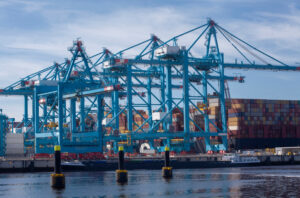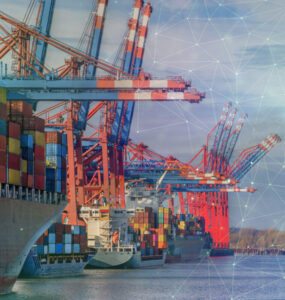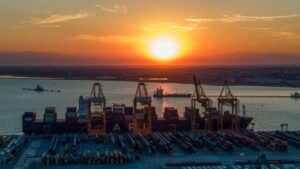Maritime Research and Innovation UK (MarRI-UK) has submitted a Comprehensive Spending Review bid seeking £530 million ($685.7 million) of Government co-investment for its Zero-carbon Coastal Highway Programme, a project that looks to cut emissions in short sea shipping.
In a statement MarRi-UK said the programme aimed to “transform the UK goods distribution reliance on road haulage” and enable the UK to become a leading innovator in the global maritime sector. The ambition is to move more than 25% of UK’s land haulage tonne km via a zero-carbon automated fleet by 2030.
MarRI-UK is an industry-led initiative, currently involving six companies (BAE Systems, Babcock, BMT, Lloyd’s Register, Shell, QinetiQ), and four universities (Newcastle, Southampton, Strathclyde, UCL), partnering with the Society of Maritime Industry and Maritime UK, to address the lack of co-ordination and resource in the maritime research and development.
The organisation estimates that a successful transition to the network will add £1.8 billion additional revenue to the UK, create 39,000 extra jobs and reduce land-based CO2 emissions by 30-40%. It will also:
- Reduce road congestion by 25%;
- Distribute wealth to regional UK coastal communities
- Contribute to the Zero Carbon Maritime Plan
- Improve British shipbuilding productivity and competitiveness
- Enhance port infrastructure whilst reducing their carbon footprint
- Increase export opportunities
- Improve safety and reduce loss of life
The UK relies predominantly on road freight to distribute goods from its ports to centres of manufacturing and use. The majority of freight is carried by Heavy Goods Vehicles (HGVs) which due to the large number of freight transactions, produces high levels of CO2 emissions, worsens air quality and increases the risk of road accidents.
It is essential that alternatives are sought to address climate change. There is also a need to enhance UK resilience to major incidents, such as the on-going COVID-19 pandemic, by providing alternative means for transporting freight that is less reliant on human intervention and congested land-based transportation.
MarRI-UK said by creating a “radical new zero-carbon approach” to transport goods as part of an integrated autonomous system has not been attempted anywhere in the world. It would allow the UK maritime shipbuilding and service sector to sell to the world’s ever-expanding need for high quality advanced maritime transportation.
The bid is is also supported by leaders of Associated British Ports, British Ports Association, UK Major Ports Group, UK Chamber of Shipping, Maritime Skill Alliance, and the Maritime and Coastguard Agency (MCA).
John Howie MBE, Chief Executive – Marine, Babcock International Group and Chair of MarRI-UK, said: “The zero-carbon coastal highway initiative has the potential to transform the transportation of goods in the UK, delivering significant reductions in environmental emissions through a solution that will showcase the very best of UK maritime innovation.
“By working together, across industry and academia, we can offer collaborative, forward thinking solutions that will benefit both the UK and wider maritime industry.
“Targeting a reduction in land-based transportation requirements underpins global environmental emissions ambitions and supports local communities however, is not without its challenges. We must continue to join forces wherever we can to provide a futureproof trade option.”
Sarah Kenny OBE, Chief Executive Officer of BMT and Vice-Chair of Maritime UK, said: “As Chief Executive Officer of BMT and Vice-Chair of Maritime UK, we believe that this Zero Carbon Coastal Highway Flagship Programme will both revitalise and enable the UK industry to recapture its position as leading innovators in the global maritime sector.
“Working with our partners at a national level, we can ensure that there is a strong likelihood that maritime related priorities will be looked upon favourably. After all, as one of the most significant industries in the United Kingdom and the facilitator of 95% of all trade via seaborne means, we know we have a significant role to play in post COVID-19 economic recovery.
“Making the UK a scientific superpower, including leading in the development of technologies that will support the government’s ambition to reach net zero carbon emissions by 2050 is paramount to the UK’s future.
“The Zero Carbon Coastal Highway Flagship Programme of technology development will, we believe, deliver a transformational change to the UK Transport Sector, reducing significantly emissions from the road network, enhancing our Ports and Harbours, supporting the levelling-up agenda through regional development and new innovative business models, accelerating change internationally.
“Based on this, the UK maritime sector is well-positioned on all the priorities set out by the Government and the Chancellor for the latest Comprehensive Spending Review.”









